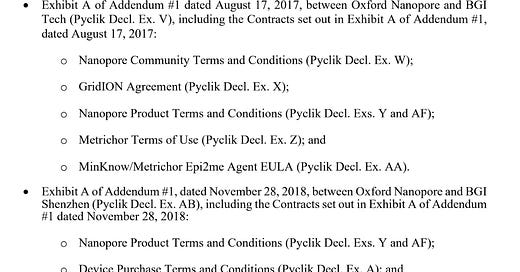ONT Suing BGI Again!
To recap:
Oxford Nanopore made moves to sue the BGI and associated entities in the US.
Oxford Nanopore are now making moves to sue the BGI and associated entities in the UK.
If you’re an Oxford Nanopore user you should be somewhat concerned. Oxford Nanopore successful used their user agreements with you to strong arm me into removing posts from this substack1. Previously they have used these to restrict which kits you can use with your sequencer.
Here they are using them to suggest that if you use Oxford Nanopore products, you can’t develop a competing platform. So, for example, if you are a university using an Oxford Nanopore sequencer and a group over in the physics department is considering commercializing a new DNA sequencer, you might have reason for concern.
This may be an even greater concern to commercial entities building applications on top of Oxford Nanopore sequencers, in particular if Oxford has expressed interest in that application space itself. For example… protein sequencing, biomarker detection or perhaps even things like custom multiplexing approaches…
What they don’t seem to be doing is directly asserting that the BGI are violating Oxford nanopore patents. I assume because there is no strong evidence of this at this point.
The User Agreements
I posted the original US filings over here. But here’s the list of contracts cited in the US legal action against BGI:
They specifically cite certain parts of the user agreement such as:
Without direct evidence that the BGI reversed engineered Oxford Nanopore devices this seem like quite a stretch.
There isn’t yet much evidence that the BGI did this or that they have shipped any devices. The whitepaper the BGI published described the technology in some detail, and made fairly convincing arguments that they have sidestepped much of Oxford’s IP.
The sensible thing would it seems be to wait until there is clear evidence. Like Illumina did when Oxford seemingly violated their MspA IP.
So… could Oxford use the same arguments to claim ownership of a nanopore sequencer developed at a university that also happens to use Oxford products?
Personally I don’t see why not.
Oxford alienating customers to this degree is perhaps unlikely. But if they saw a financial advantage… I could see it happening.





